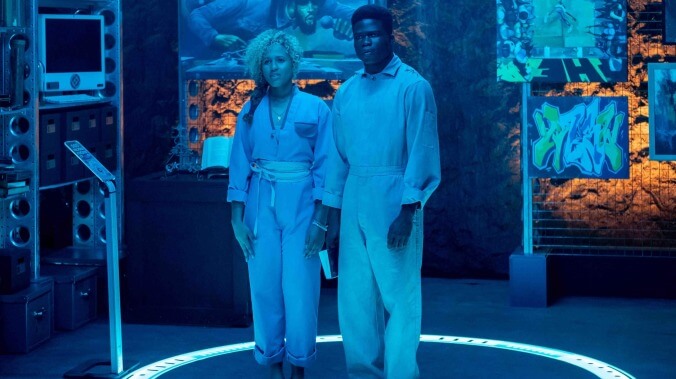Hulu’s Utopia Falls forgets the founding mothers of hip-hop


About 13 minutes into the fifth episode of Hulu’s hip-hop-infused, sci-fi drama Utopia Falls, burgeoning revolutionaries Aliyah 5 (Robyn Alomar) and Bohdi 2 (Akiel Julien) are seen engaging in an age-old debate regarding the merits of “old school” versus “new school.” As an up-and-coming scholar of the now-ancient culture of hip-hop, Bohdi is beholden to the originators: DJ Cool Herc, Grandmaster Flash, Chuck D., KRS-1, to name a few. Aliyah dismisses Bohdi’s newfound heroes as “wack” (a term that, now hundreds of years old, she is ready to dust off and claim with great amusement) before arguing in favor of newer acts that carried the torch and moved the genre forward—namely Kendrick Lamar, Drake, J. Cole, LL Cool J, and Beastie Boys.
Bohdi never speaks to the pioneering spirit of Roxanne Shante, the first lady of battle rap, or Salt-N-Pepa, the first female rap group to achieve a platinum-status record. We don’t hear Aliyah gush about Cardi B, the first female rap soloist to win a Best Rap Album Grammy, or the enduring impact of The Miseducation Of Lauryn Hill. Neither character utters a word about Queen Latifiah, who is one of the most successful, barrier-breaking rap artists in the industry’s history. With the exception of a passing mention of Nicki Minaj and an unacknowledged Megan Thee Stallion song in the background of a party, women are largely left out of the conversation. To add a dash of almost laughable irony, this debate takes place in the episode titled “Lose Control,” a highly probable reference to the iconic Missy Elliott and Ciara’s 2013 smash hit.
It’s a moment that emblematizes one of Utopia Falls’ most glaring issues: For a series that takes great strides to pay homage to hip-hop’s founding fathers, it neglects to pay suitable respect to its founding mothers. While one could argue that the mishap mirrors a tendency to erase the undeniable impact of women in modern discussions about the culture, it’s an especially egregious oversight for a show that specifically sets out to center the history of hip-hop. Ultimately, it contributes to a story that is clumsy and, at best, incomplete.
Creator R.T. Thorne’s vision is as ambitious as it is promising, at first. Set in the distant future, New Babyl is an ostensibly idyllic colony comprised of four sectors: Progress, Reform, Industry, and Nature. Under heavily present authoritarian rule, the community comes alive at the annual Exemplar, a music competition that pits artistically trained youth from each sectors against each other for a chance at fame and honor. A patriotic and privileged daughter of a tribunal authoritarian, Aliyah plans to take part in the competition with the respectability New Babyl has come to expect over the 73 years since its inception. Things change when she and Bohdi stumble upon a DNA-locked vault in the woods, which contains forbidden relics of now-ancient art, books, and music. An anthropomorphic digital archive (voiced by Snoop Dogg, who isn’t committed to any other characterization here outside of “Snoop Dogg, but as a computer”) introduces hip-hop to the young competitors and through music, old footage, and art, they learn about protest and rebellion. The discovery causes them to question their own government’s decision to hide such treasures. Why would New Babyl’s government work so diligently to cover up America’s past? More importantly, what else are they hiding?
Again, this premise is promising. Not only is it an opportunity to celebrate hip-hop’s political foundation, but to also present its rich history—a culture literally built by Black and brown creators—to a young audience. It’s an impossibly vast genre, and one 10-episode season could only hope to scratch the surface of its origins. But to position a young woman as the supposed face of a revolution and not make her appear even a little curious—visibly, at least—of the historical women who built the platform that she hopes to bravely use to lead her colony to freedom feels like such a missed opportunity. For the female trailblazers to not be just as present as their already highly touted brethren is a surefire way to leave a solid portion of your intended audience behind.
And truly, if this were the only oversight that Utopia Falls was guilty of, it would still have a fighting chance at being watchable. But while Aliyah, Bohdi, and the majority of the young Exemplar hopefuls work together against the powers that be, Aliyah’s ex and fellow contestant Tempo (Robbie Graham-Kuntz), and the ruthless Authority Phydra (Kate Drummond) are two figures who remain loyal to the state. Tempo, a white male who vocally opposes the discovery of hip-hop and Aliyah’s budding friendship with Bohdi, angrily commits a deed that directly results in Bohdi’s unlawful imprisonment. While these events are frustrating to watch, they give Utopia Falls an opportunity to explore how race and the justice system are inextricably linked, especially through all the ways that Phydra fails to protect the citizens in favor of her own personal interests.
The season’s finale includes a twist that gives audiences unneeded room to debate the motives behind Phydra’s overtly racist actions, including her proclivity to ignore evidence that exonerates Bohdi of any actual wrongdoing. There are moments that call for complexity and nuance. This—an authoritarian exerting their internal bias and power to actively harm people of color—is not one of them. There are instances when monsters harbor no complicated or understandable reasoning for the abuse they inflict—sometimes they’re just monsters. Arming a dangerous figure like Phydra with a personal reason for her horrific behavior feels like a slap in the faces of those at risk of authoritarian overreach every single day. Of all the creative choices that went into this project, this one is the most questionable, and perhaps the most unacceptable.
The one joyous aspect of this experience comes with the curated collection of music—including The Roots, Daniel Caesar, Jessie Reyez, Busta Rhymes, and others—that informs the series and is an effective pull for younger audiences. But the music does little to mask mostly flat performances, clunky and redundant dialogue, and disjointed rationale behind some of the characters’ actions. For what it’s worth, Julien and Alomar do show drive and heartfelt connections with their fictional counterparts, which results in a handful of moments that feel sincere.
In some ways, Utopia Falls is under a hefty amount of pressure. As the creative forces behind the show tout, it is the first sci-fi series to utilize hip-hop. And maybe that’s why the failures of this execution sting so much: When it comes to imagined worlds where Black art is celebrated so rapturously in the future, there really aren’t any other properties to choose from. While it can’t possibly satisfy every single person craving this manner of representation, those who are looking toward Utopia Falls to set a bar may find themselves still wanting. Should it survive beyond its first season—and truthfully, getting a second shot wouldn’t be the worst thing—we can hope that any further attempts to continue this story involve a more well-rounded tribute to all of the voices that make the culture so vibrant, relevant, and for many, life-saving.